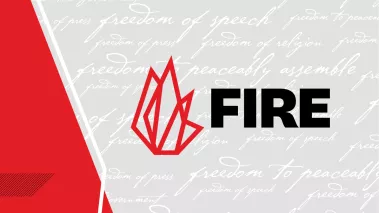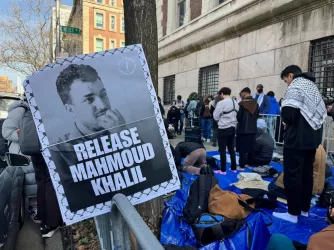Table of Contents
Oxy President's Departure Doesn't Erase Speech Issue

On June 8, Ted Mitchell, president of Occidental College in Los Angeles, officially announced that he will be stepping down. Occidental's press release presented Mitchell's resignation as if it were just another glorious event in the college's spotless history. Unsurprisingly, the release mentions neither a multimillion-dollar lawsuit brought against Mitchell and his administration for alleged free speech violations, defamation and invasion of privacy, nor his virtually unprecedented decision to dissolve the student government because of students' alleged "abuse" of free speech - much less the terrible national publicity these events have brought Oxy.In the rose-colored age of press releases for all occasions, such important omissions are par for the course.
The free speech lawsuit was filed March 15 by Jason Antebi, former vice president of the student government and former co-host of a popular student radio show called "Rant and Rave." The show's popularity was probably partly because of its "shock jock"-like humor, with Antebi mocking Christians, Republicans, men, women, Mormons, Jews, Jehovah's Witnesses, Democrats, Bill O'Reilly, Al Franken, "Star Trek" fans, "Star Wars" fans, short people, tall people, fat people and skinny people, among others.
Antebi apparently crossed a line, however, when, during his March 11, 2004, broadcast, he mocked two student government representatives who had previously tried to have him impeached. He called the female representative a "bearded feminist" and the male representative a nickname involving the word "douche."
No, this wasn't polite. But that was kind of the point. Crude jokes are standard among college students and are quite common in the free-wheeling world of college radio. The insulted students complained, and Occidental's dean removed Antebi from his radio show. The student government members he mocked then filed sexual harassment complaints against him, citing other off-color jokes that were not directed at them and alleging that Antebi's satirical show "disrespect[ed] and slander[ed]" "women, diversity and Occidental College."
Apparently, Antebi had not only angered the targets of his satire (imagine that) but had also harassed his audience in general. Despite the speciousness of the harassment claim and the fact it was clearly made in the context of an existing political struggle among student representatives, Oxy found Antebi guilty of violating federal sexual harassment law for his on-air jokes.
Occidental's strategy for dealing with the negative publicity from the lawsuit has been to spin this as a situation in which the college simply decided to remove a rude radio show host from the air. Although Antebi's firing is problematic because the dean who fired him completely disregarded the wishes of the radio station's student managers supposedly in charge of such decisions, the case is much more serious.
Sadly, punishment for "offensive" speech is hardly novel on the modern campus. The events that make this case truly remarkable are Occidental's warping of federal harassment law, its use of the Antebi controversy as an excuse to dissolve the student government, and its campaign to justify Antebi's punishment after the fact.
On March 30, 2004, the Foundation for Individual Rights in Education first wrote Mitchell to protest Antebi's firing and the sexual harassment allegations against him. On April 2, 2004, Oxy's general counsel, Sandra Cooper, responded with a letter making some astonishing and serious allegations against Antebi.
Antebi was apparently a ferocious racist, a criminal, a vandal who created a climate of fear on campus so serious that women were "unable to concentrate, sleep or even walk across campus without fear."
One of the foundation's purposes of sending an initial letter is to give colleges the chance to point out facts the foundation may not have been aware of, so the foundation was appreciative, at first, that Cooper had informed it of such important "facts." When the foundation researched the allegations set forth in Cooper's letter, however, it found that accusation after accusation was simply and obviously false.
While it is impossible to recount all of the legal and factual errors and misrepresentations in Cooper's letter in short order, several particularly egregious examples deserve special mention.
First, Cooper's letter stated that Antebi publicly fired two black student workers, then taunted them with a segment on his radio show called "Token Black Girls." This is patently false.
In November 2003, Antebi aired a segment titled "Token Black Girls." The segment featured three black women who were friends of Antebi, one of whom named the segment "Token Black Girls" herself as a joke apparently mocking tokenism.
Nearly a month later, the student government (when Antebi was a member) voted to fire two black student workers, citing the misuse of student government funds. How, outside of "Star Trek" technology, could Cooper have believed that a radio segment aired in November was in response to a firing in December? It boggles the mind.
Cooper's letter also alleged that after students complained about the firing and taunting of the student workers, Antebi vowed revenge against them in his online diary. Cooper's letter quotes a Nov. 9, 2003, entry in Antebi's online diary promising to "get back at people who have wronged me." In fact, Antebi posted that entry in response to a breakup the night before. Antebi's former significant other even contacted the Foundation for Individual Rights in Education to confirm that this entry was about the breakup. In other words, Cooper took Antebi's angry breakup missive and twisted its words into a threat against completely different individuals, supposedly in retaliation for events that had not even occurred at the time he posted the entry.
Perhaps most outrageously, Cooper's letter insinuated that Antebi was involved in a number of other incidents, some criminal, including late-night sexual telephone calls to the Campus Women's Center, anonymous threatening e-mails to members of the gay community, defacing Women's Center brochures and slashing tires in the Women's Center parking lot. Despite the fact it takes only the thinnest of evidence to charge a student with offenses in most student judiciaries, Antebi was never charged with any of these offenses.
FIRE concluded that Cooper included this laundry list of allegations in an effort to create the appearance of a messy factual situation in order to dissuade organizations such as FIRE and the American Civil Liberties Union from defending Antebi.
The morning that he received FIRE's first letter, Mitchell announced he dissolved the student government. As justification for this, he cited "examples of abusive, intimidating, harassing behavior that have no place on our campus" that were "masquerading as open expression." Although he did not name Antebi, almost all the reasons he gave for dissolving the government related to the college's accusations against Antebi. The dissolution of the student government meant that Occidental's administration took over some $441,000 in student fees normally administered by the students' elected representatives.
Dissolving the student government is a remarkable step. Even Kent State did not dissolve its student government at the height of the riots in the 1970s. The message it sends students about the value of democratic institutions is truly chilling, and is more becoming of a college in a totalitarian state than of one that prepares students to live in a pluralistic democracy.
Occidental's rationale for punishing Antebi is part of a national problem that is acute in higher education, where any unpopular offensive speech is deemed "harassment." Although Occidental College is private, California's Leonard Law applies First Amendment protection to students at private colleges. Under the First Amendment, parody and satire enjoy the strongest of constitutional protection precisely because they tend to anger and provoke listeners. The fact that certain students did not like being picked on does not mean that they were harassed. If it were otherwise, virtually any modern comedian would be sued into submission after every performance.
Of course, Oxy's interpretation of harassment is so muddled as to threaten any provocative speech on campus. By its definition, people apparently do not even have to hear what is said about them to be harassed: Occidental found that Antebi's jokes about his own mother "indicate hostile sexual harassment and gender harassment of his mother."
Occidental's handling of this case has been condemned by a remarkable array of free speech defenders including FIRE, the ACLU of Southern California, Students for Academic Freedom, the Student Press Law Center and PEN USA. It even earned Oxy a 2005 Campus Outrage Award from the Collegiate Network. The recent multimillion-dollar lawsuit only added insult to the injury of the existing public relations disaster.
Is it merely coincidence that the dean of students who fired Antebi, the student government advisor who was involved with the case, and the president, Mitchell, have all left or will soon leave Oxy? In an age of indefatigable spin, one can only wonder.
Recent Articles
FIRE’s award-winning Newsdesk covers the free speech news you need to stay informed.

VICTORY: Federal court blocks Texas A&M’s unconstitutional drag ban

Columbia caves to feds — and sets a dangerous precedent

American Jews must not give an inch on free speech — even when words hurt us
